800億円でしたかね、
安倍が
自民総裁になって
いち早く
(こいつは、カモや)
と見抜き、
わずか2、3か月で
大儲けしてくれた人に
ジョージ・ソロスという
著名な
米国の投資家がいます。
さんざ日本を相手に稼ぎまくって
申し訳ないと思ってくれたのでしょうか、
5日、アメリカCNBCテレビの
インタビューで
日本の
懸念事項が
どこにあるか
示してくれました
(2013年4月8日付日刊ゲンダイ
「ソロス氏『日銀の緩和策は危険』」参照)。
日本人は、
円安につき、
大きな誤解をしています。
ソロス氏は、
黒田日銀総裁を
「大胆」と
一応は褒めたようです。
しかし、その後に続く言葉が
問題です。
いわく、日本の人々が
円安が続きそうだと考えて
海外に資金を移せば、
円は雪崩のように下落する恐れがある云々。
どういうことかと言うと、
有望な企業は
すべて日本から逃げ出すということでしょ?
もし、そうだとするなら、
残された国民は、
どうやって生活するのでしょう。
■資料(動画あり)
「黒田にそんなガッツがあるとは誰も信じなかった」ジョージ・ソロス
<ソロス発言書き起こし>
Market Hack(2013年04月06日00:49)
☆ 記事URL:http://markethack.net/archives/51869882.html
CNBCがジョージ・ソロスにインタビューしています。今、日本に起きていることを世界的な視点から理解する上で重要な、そして我々個人が今度、どう行動すべきかに関して示唆に富む発言なので、抄訳しておきます。
CNBC: The report says that you made a billion dollar shorting yen. What are you doing now? Are you breaking Bank of Japan now?
円をショートして10億ドル儲けたそうだが。今でもショートしているのか? 日銀を破産させる気か?
Soros: I think Bank of Japan is eager to have people trying to do that.
日銀は投資家が円をショートすることを演出していると思う。
CNBC: What do you think Mr. Kuroda is doing? People are talking Japan finally awakening after two and a half decade of self imposed austerity and depression. All of a sudden , it is like the dawn is awakening in Japan. Do you believe the story?
黒田総裁の采配をどう思う? 日本がついに25年間の眠りから覚め、切り詰めと不況から脱却しようとしているが。まるで突然、朝が来たような塩梅だが、あなたはこれを信じるか?
Soros: It is a sensation. It broke some of the taboos of monetary policy orthodoxy and it is a very daring undertaking and actually last night Turner who has joined FSA who is now running FSA and European Stability Institute, who was a candidate for Bank of England. Now he joined us. I think it is a great coup for us not even for the world. Because he is one of the most original thinkers on this issue. He gave a speech last night which I think provided the theoretical foundations on the basis which you can understand what Japan is trying to do and that is that on conditions of deflation that Japan has been in for the last twenty five years. One way to do that is to have monetary policy which buys government bonds in the market and government bonds have been providing fiscal stimulus so that effectively does not increase the amount of debt outstanding because what as government sells bonds on one hand and the bank buys on the other hand so the government own the bank, effectively does not increase the debt, but, if it stimulates the economy uses the unused resources then the economy grows.
これはセンセーションだ。金融政策のタブーを打ち破っている。これは凄い大胆なことで、最近、アイネットに参加したターナーも昨夜のスピーチで語ったことだがとても果敢な試みだ。ターナーはFSAとESIを切り盛りしているがこの問題に関して彼は最もオリジナルな考え方を持つ人なので、アイネットに彼が参画したことを嬉しく思っている。彼の昨夜のスピーチがこの問題に関しての理論的な基礎を提供していると思う。それを見ると日本が今やろうとしていることがわかる。ひとつのやり方は国債を市場で購入することで債券の流通残高を増やさずに経済に刺激を与えるというものだ。片方で国債をイシューしておいて、もう片方でそれを買うので、政府が中央銀行を牛耳っているのと同じだ。この方法で景気が刺激できるのなら、活用されていないリソースを使うことになるので景気は拡大する。
CNBC: Everybody has to be on board, though, not just policy makers. If people continue to suck away the money under their Tatamis, and refuse to participate, this could all fall flat in the face.
でもそのためには皆が参加しなければいけないですよね? 若し人々がタタミの下にキャッシュを貯め込み続ければ、この試みは成功しない。
Soros: Well, it could, but, actually this is why there is something so dramatic that people can’t ignore it. So, it has actually galvanized people. If you go to Japan, you will find that people are quite excited. Because for twenty five years, Japan has been dying a slow death. And now they woke up. The fascinating thing is that in Europe, the austerity program is actually leading Eurozone into exactly the same policy that Japan is now trying to escape from, after twenty five years.
それはそうだ。だからこそ、何かドラマチックなことを打ち出して、庶民が無視できないような事を引き起こす必要があるのだ。実際、日本人は活性化されている。日本に行くと、人々は興奮している。なぜなら過去25年間、日本は緩慢な死への道を辿ってきたからだ。いま、日本はそれから覚めた。面白いのは今、欧州は日本を緩慢な死へ追いやったような政策を、いま採用しようとしている点だ。
CNBC: Do you feel worried though? I mean, central banking, the whole concept of operating a central bank has never been sexy. We never talked about the central bank with the frequency as now. Everybody is now pulling a “Helicopter Ben” right? Just kind of scattering money around. Doesn’t that worry you?
懸念は無いのか? 本来中央銀行というのはセクシーな仕事ではないわけで、今ほど連日、中銀のことを頻繁に議論することは過去に無かった。皆が「ヘリコプター・ベン」になろうとしている。これを不安に思わないか?
Soros: It worries me a great deal because as Turner explained last night, incidentally you can get that on the web over the Inet site so anyone can watch it, and he explains that this is an avoidable disaster. The slow death of Japan was self inflicted. The austerity which is now prevailing in Europe is also self inflicted. So the task of macro economics is to avoid avoidable mistakes and there are so many of them. It is very important to understand it because the consequences for peoples’ lives are so far reaching, millions of people are affected by it.
もちろん不安だ。ターナーが昨夜説明したように(彼のスピーチはネットにUPされているので視聴できるが)日本の「緩慢な死」は、避けることができたミスだった。日本は自分で自分のことを痛め付けたのだ。今、欧州が採用している切り詰め策も、自ら自分を痛めつけるような政策だ。マクロ経済学の任務とは、避けられるミスを避けるということだ。これを理解しないと何百万人という庶民の生活に影響が出る。
CNBC: What are the avoidable mistakes that policy makers are making right now?
避けられることが出来たミスとは何か?
Soros: Well unused resources. If you have a de-leveraging and deflationary conditions then you have unemployment and also unused capital so people are afraid and sit on the money and put the money under the mattress instead of investing it. You can do a certain amount by quantitative easing and you can do some by fiscal policy. By combining the two, you could actually have a policy that could get out of this.
活用されていないリソースに注目すべきだ。レバレッジを落とす過程で、デフレが生じると、それは失業を招く。そして資本も活用されない。人々はリスク回避姿勢になり、キャッシュを貯め込む。量的緩和政策や財政政策でそれらを是正することはできる。
CNBC: You have been quite critical about self imposed austerity in Europe by Germany.
ドイツが中心となって進められている欧州の切り詰め策にあなたは批判的だか。
Soros: I am going to give speech in Frankfurt next Tuesday I will put forward a way to escape it which is in some ways similar to what Japan is doing now, but what Japan is now doing is actually quite dangerous because they are doing it after twenty five years of just simply accumulating deficits and not getting the economy going so if what they are doing get something started, it may not able to stop it. You see if the Yen starts to fall, people in Japan realize that it is liable to continue, and want to put the money abroad, then a fall will become like an avalanche, you can start it, but you may not be able to stop it.
火曜日の夜、フランクフルトでスピーチする。そこでどうすればよいかについて喋る。それは実際のところ今、日本で採られている政策に近い。ただ今日本がやろうとしている政策は、結構リスクも伴うものだ。なぜなら日本は過去25年間、なにもせず赤字を積み上げてきたので、もし新しいことを今はじめたら、それをはじめることはできるけど、ストップさせることは出来ないかもしれないからだ。若し円がどんどん円安になると、日本人は円安が今後も続くと信じるかも知れない。すると海外投資を増やしたいと考えるだろう。するといままでチョロチョロした円の減価が、とつぜん雪崩のようなことになるリスクもある。だから一度スタートしたことは、ストップできないかも知れないのだ。
CNBC: What kind of scenario are you suggesting? Are you suggesting free fall?
あなたは円の暴落の可能性を言っているのか?
Soros: Well, capital fright. People investing abroad. You can put money in US Treasuries. You see when Japan was in deflation, and you get only 1% on Japanese bonds, but the value of Yen was appreciating. So, in real terms you were getting 3%. If the Yen depreciate, say 5%, and you only get 0.5% yield, then you lose 4.5% a year, where if you put the money in US Treasuries then you make money.
資本逃避だ。人々が海外にお金を避難させる。たとえば米国財務省証券とかね。日本がデフレだったときはJGBの金利が1%でも実際には物価は下がったので実質ベースでは3%くらいの利回りになる計算だった。でも若し円が5%減価するとしたまえ。すると利回りが0.5%しかなければ、一年に4.5%近く損することになる。だから損を避けるために米国財務省証券にシフトするわけだ。
CNBC: They do not have the same purchasing power than four month ago.
去年に比べれば為替が動いたので、もう同じ購買力はないですよね?
Soros: Well, this only started three months ago and nobody really believed that Kuroda will have courage to do that and act as aggressively as he did. The amount of quantitative easing he is doing is the same as the United States, but, Japan is only 1/3rd the size of the US. So, it is 3X more powerful.
まだ始まって三ヶ月程度だ。それに黒田総裁にそんなガッツがあるなんて、誰も思わなかった。あんなにアグレッシブだとは思わなかった。日本の量的緩和は米国と同じ規模だけど、日本経済はそもそも米国の経済の3分の1のサイズだから、緩和は3倍パワフルだ。
CNBC: You have fairly significant exposure to Japan, I believe about 10%?
あなたは日本のポジションは10%程度だそうですが?
Soros: Well I do not run it. I do not know what they are going to do.
今は運用にはタッチしていない。だからファンドの担当者が今後どうするかはわからない。
CNBC: You are investing in telco companies in Myanmar.
ミャンマーの通信会社に投資しているらしいが?
Soros: They only have 7% penetration. You have to build a lot of towers. It requires a lot of investments. I think Myanmar is on the right track.
普及率は7%に過ぎない。今後、セル・タワーをどんどん立てる必要がある。先行投資が必要だ。ミャンマーは正しい路線を歩んでいる。
CNBC: What is your view on China?
中国は?
Soros: China is probably one of the most dynamic markets in the world. They need to change the growth model. China is switching and adjusting. There are a lot of problems. Everybody knows that there is a property bubble that needs to be deflated. But, I think the government also knows it and also has the resources to do it so I think it will not end in a crash.
中国は世界で最もダイナミックな国だ。ただ成長のモデルを変更する必要がある。いま彼らはそれをやっている。もちろん問題も多い。中国が不動産バブルになっていることは誰もが知っている。それは冷やしてやる必要がある。しかし政府はそのことを良く分かっているし、方策もある。だからクラッシュは起きないだろう。
CNBC: Is Europe on a right path?
欧州は?
Soros: Unfortunately Europe is not. If you contrast it to Japan, Japan is trying to escape from slow death from the policy that Europe has just now adopted. They are now moving in opposite directions.
残念ながら欧州の方向性は間違っている。日本と比べてみたまえ。日本は、過去25年やってきた「緩慢な死」からなんとか抜け出そうとしているのに、欧州はその日本とは正反対の方向を歩んでいる。
安倍が
自民総裁になって
いち早く
(こいつは、カモや)
と見抜き、
わずか2、3か月で
大儲けしてくれた人に
ジョージ・ソロスという
著名な
米国の投資家がいます。
さんざ日本を相手に稼ぎまくって
申し訳ないと思ってくれたのでしょうか、
5日、アメリカCNBCテレビの
インタビューで
日本の
懸念事項が
どこにあるか
示してくれました
(2013年4月8日付日刊ゲンダイ
「ソロス氏『日銀の緩和策は危険』」参照)。
日本人は、
円安につき、
大きな誤解をしています。
ソロス氏は、
黒田日銀総裁を
「大胆」と
一応は褒めたようです。
しかし、その後に続く言葉が
問題です。
いわく、日本の人々が
円安が続きそうだと考えて
海外に資金を移せば、
円は雪崩のように下落する恐れがある云々。
どういうことかと言うと、
有望な企業は
すべて日本から逃げ出すということでしょ?
もし、そうだとするなら、
残された国民は、
どうやって生活するのでしょう。
■資料(動画あり)
「黒田にそんなガッツがあるとは誰も信じなかった」ジョージ・ソロス
<ソロス発言書き起こし>
Market Hack(2013年04月06日00:49)
☆ 記事URL:http://markethack.net/archives/51869882.html
CNBCがジョージ・ソロスにインタビューしています。今、日本に起きていることを世界的な視点から理解する上で重要な、そして我々個人が今度、どう行動すべきかに関して示唆に富む発言なので、抄訳しておきます。
CNBC: The report says that you made a billion dollar shorting yen. What are you doing now? Are you breaking Bank of Japan now?
円をショートして10億ドル儲けたそうだが。今でもショートしているのか? 日銀を破産させる気か?
Soros: I think Bank of Japan is eager to have people trying to do that.
日銀は投資家が円をショートすることを演出していると思う。
CNBC: What do you think Mr. Kuroda is doing? People are talking Japan finally awakening after two and a half decade of self imposed austerity and depression. All of a sudden , it is like the dawn is awakening in Japan. Do you believe the story?
黒田総裁の采配をどう思う? 日本がついに25年間の眠りから覚め、切り詰めと不況から脱却しようとしているが。まるで突然、朝が来たような塩梅だが、あなたはこれを信じるか?
Soros: It is a sensation. It broke some of the taboos of monetary policy orthodoxy and it is a very daring undertaking and actually last night Turner who has joined FSA who is now running FSA and European Stability Institute, who was a candidate for Bank of England. Now he joined us. I think it is a great coup for us not even for the world. Because he is one of the most original thinkers on this issue. He gave a speech last night which I think provided the theoretical foundations on the basis which you can understand what Japan is trying to do and that is that on conditions of deflation that Japan has been in for the last twenty five years. One way to do that is to have monetary policy which buys government bonds in the market and government bonds have been providing fiscal stimulus so that effectively does not increase the amount of debt outstanding because what as government sells bonds on one hand and the bank buys on the other hand so the government own the bank, effectively does not increase the debt, but, if it stimulates the economy uses the unused resources then the economy grows.
これはセンセーションだ。金融政策のタブーを打ち破っている。これは凄い大胆なことで、最近、アイネットに参加したターナーも昨夜のスピーチで語ったことだがとても果敢な試みだ。ターナーはFSAとESIを切り盛りしているがこの問題に関して彼は最もオリジナルな考え方を持つ人なので、アイネットに彼が参画したことを嬉しく思っている。彼の昨夜のスピーチがこの問題に関しての理論的な基礎を提供していると思う。それを見ると日本が今やろうとしていることがわかる。ひとつのやり方は国債を市場で購入することで債券の流通残高を増やさずに経済に刺激を与えるというものだ。片方で国債をイシューしておいて、もう片方でそれを買うので、政府が中央銀行を牛耳っているのと同じだ。この方法で景気が刺激できるのなら、活用されていないリソースを使うことになるので景気は拡大する。
CNBC: Everybody has to be on board, though, not just policy makers. If people continue to suck away the money under their Tatamis, and refuse to participate, this could all fall flat in the face.
でもそのためには皆が参加しなければいけないですよね? 若し人々がタタミの下にキャッシュを貯め込み続ければ、この試みは成功しない。
Soros: Well, it could, but, actually this is why there is something so dramatic that people can’t ignore it. So, it has actually galvanized people. If you go to Japan, you will find that people are quite excited. Because for twenty five years, Japan has been dying a slow death. And now they woke up. The fascinating thing is that in Europe, the austerity program is actually leading Eurozone into exactly the same policy that Japan is now trying to escape from, after twenty five years.
それはそうだ。だからこそ、何かドラマチックなことを打ち出して、庶民が無視できないような事を引き起こす必要があるのだ。実際、日本人は活性化されている。日本に行くと、人々は興奮している。なぜなら過去25年間、日本は緩慢な死への道を辿ってきたからだ。いま、日本はそれから覚めた。面白いのは今、欧州は日本を緩慢な死へ追いやったような政策を、いま採用しようとしている点だ。
CNBC: Do you feel worried though? I mean, central banking, the whole concept of operating a central bank has never been sexy. We never talked about the central bank with the frequency as now. Everybody is now pulling a “Helicopter Ben” right? Just kind of scattering money around. Doesn’t that worry you?
懸念は無いのか? 本来中央銀行というのはセクシーな仕事ではないわけで、今ほど連日、中銀のことを頻繁に議論することは過去に無かった。皆が「ヘリコプター・ベン」になろうとしている。これを不安に思わないか?
Soros: It worries me a great deal because as Turner explained last night, incidentally you can get that on the web over the Inet site so anyone can watch it, and he explains that this is an avoidable disaster. The slow death of Japan was self inflicted. The austerity which is now prevailing in Europe is also self inflicted. So the task of macro economics is to avoid avoidable mistakes and there are so many of them. It is very important to understand it because the consequences for peoples’ lives are so far reaching, millions of people are affected by it.
もちろん不安だ。ターナーが昨夜説明したように(彼のスピーチはネットにUPされているので視聴できるが)日本の「緩慢な死」は、避けることができたミスだった。日本は自分で自分のことを痛め付けたのだ。今、欧州が採用している切り詰め策も、自ら自分を痛めつけるような政策だ。マクロ経済学の任務とは、避けられるミスを避けるということだ。これを理解しないと何百万人という庶民の生活に影響が出る。
CNBC: What are the avoidable mistakes that policy makers are making right now?
避けられることが出来たミスとは何か?
Soros: Well unused resources. If you have a de-leveraging and deflationary conditions then you have unemployment and also unused capital so people are afraid and sit on the money and put the money under the mattress instead of investing it. You can do a certain amount by quantitative easing and you can do some by fiscal policy. By combining the two, you could actually have a policy that could get out of this.
活用されていないリソースに注目すべきだ。レバレッジを落とす過程で、デフレが生じると、それは失業を招く。そして資本も活用されない。人々はリスク回避姿勢になり、キャッシュを貯め込む。量的緩和政策や財政政策でそれらを是正することはできる。
CNBC: You have been quite critical about self imposed austerity in Europe by Germany.
ドイツが中心となって進められている欧州の切り詰め策にあなたは批判的だか。
Soros: I am going to give speech in Frankfurt next Tuesday I will put forward a way to escape it which is in some ways similar to what Japan is doing now, but what Japan is now doing is actually quite dangerous because they are doing it after twenty five years of just simply accumulating deficits and not getting the economy going so if what they are doing get something started, it may not able to stop it. You see if the Yen starts to fall, people in Japan realize that it is liable to continue, and want to put the money abroad, then a fall will become like an avalanche, you can start it, but you may not be able to stop it.
火曜日の夜、フランクフルトでスピーチする。そこでどうすればよいかについて喋る。それは実際のところ今、日本で採られている政策に近い。ただ今日本がやろうとしている政策は、結構リスクも伴うものだ。なぜなら日本は過去25年間、なにもせず赤字を積み上げてきたので、もし新しいことを今はじめたら、それをはじめることはできるけど、ストップさせることは出来ないかもしれないからだ。若し円がどんどん円安になると、日本人は円安が今後も続くと信じるかも知れない。すると海外投資を増やしたいと考えるだろう。するといままでチョロチョロした円の減価が、とつぜん雪崩のようなことになるリスクもある。だから一度スタートしたことは、ストップできないかも知れないのだ。
CNBC: What kind of scenario are you suggesting? Are you suggesting free fall?
あなたは円の暴落の可能性を言っているのか?
Soros: Well, capital fright. People investing abroad. You can put money in US Treasuries. You see when Japan was in deflation, and you get only 1% on Japanese bonds, but the value of Yen was appreciating. So, in real terms you were getting 3%. If the Yen depreciate, say 5%, and you only get 0.5% yield, then you lose 4.5% a year, where if you put the money in US Treasuries then you make money.
資本逃避だ。人々が海外にお金を避難させる。たとえば米国財務省証券とかね。日本がデフレだったときはJGBの金利が1%でも実際には物価は下がったので実質ベースでは3%くらいの利回りになる計算だった。でも若し円が5%減価するとしたまえ。すると利回りが0.5%しかなければ、一年に4.5%近く損することになる。だから損を避けるために米国財務省証券にシフトするわけだ。
CNBC: They do not have the same purchasing power than four month ago.
去年に比べれば為替が動いたので、もう同じ購買力はないですよね?
Soros: Well, this only started three months ago and nobody really believed that Kuroda will have courage to do that and act as aggressively as he did. The amount of quantitative easing he is doing is the same as the United States, but, Japan is only 1/3rd the size of the US. So, it is 3X more powerful.
まだ始まって三ヶ月程度だ。それに黒田総裁にそんなガッツがあるなんて、誰も思わなかった。あんなにアグレッシブだとは思わなかった。日本の量的緩和は米国と同じ規模だけど、日本経済はそもそも米国の経済の3分の1のサイズだから、緩和は3倍パワフルだ。
CNBC: You have fairly significant exposure to Japan, I believe about 10%?
あなたは日本のポジションは10%程度だそうですが?
Soros: Well I do not run it. I do not know what they are going to do.
今は運用にはタッチしていない。だからファンドの担当者が今後どうするかはわからない。
CNBC: You are investing in telco companies in Myanmar.
ミャンマーの通信会社に投資しているらしいが?
Soros: They only have 7% penetration. You have to build a lot of towers. It requires a lot of investments. I think Myanmar is on the right track.
普及率は7%に過ぎない。今後、セル・タワーをどんどん立てる必要がある。先行投資が必要だ。ミャンマーは正しい路線を歩んでいる。
CNBC: What is your view on China?
中国は?
Soros: China is probably one of the most dynamic markets in the world. They need to change the growth model. China is switching and adjusting. There are a lot of problems. Everybody knows that there is a property bubble that needs to be deflated. But, I think the government also knows it and also has the resources to do it so I think it will not end in a crash.
中国は世界で最もダイナミックな国だ。ただ成長のモデルを変更する必要がある。いま彼らはそれをやっている。もちろん問題も多い。中国が不動産バブルになっていることは誰もが知っている。それは冷やしてやる必要がある。しかし政府はそのことを良く分かっているし、方策もある。だからクラッシュは起きないだろう。
CNBC: Is Europe on a right path?
欧州は?
Soros: Unfortunately Europe is not. If you contrast it to Japan, Japan is trying to escape from slow death from the policy that Europe has just now adopted. They are now moving in opposite directions.
残念ながら欧州の方向性は間違っている。日本と比べてみたまえ。日本は、過去25年やってきた「緩慢な死」からなんとか抜け出そうとしているのに、欧州はその日本とは正反対の方向を歩んでいる。










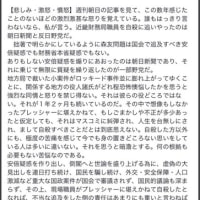
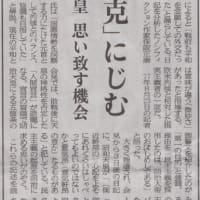
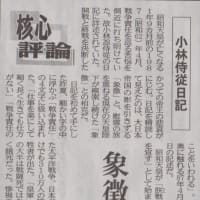


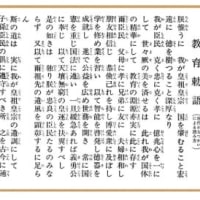



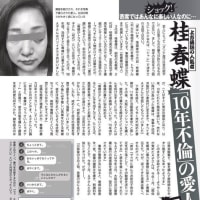
※コメント投稿者のブログIDはブログ作成者のみに通知されます